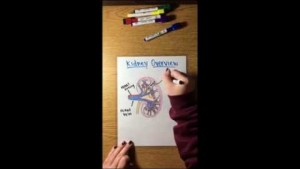Centenary biology students win national video contest

SHREVEPORT, LA – You may not be familiar with Goodpasture syndrome, but thanks to a trio of Centenary students, there’s now an award-winning YouTube video to bring you up to speed. Recent graduate Melissa Traver and current students Samantha Lyons and Andrianna Walsh won the top prize in the American Physiological Society’s Video Contest for their creative entry explaining the effects of this autoimmune syndrome on kidney function.
Lyons, Traver, and Walsh were all students in Dr. Cristina Caldari’s Principles of Immunology course in fall 2016, and their video emerged from an assignment in the class. In the past, Caldari has used episodes of “Mystery Diagnosis” (a Discovery Life show) as a teaching tool in labs. The episodes feature patients who suffer from immune system issues, usually autoimmune disorders.
“The end of the semester assignment is for groups of students to create their own ‘Mystery Diagnosis’ video and present it to the rest of the class,” explains Caldari. “This past year I saw that the American Physiological Society had this video contest, so instead of creating a ‘Mystery Diagnosis,’ I asked the students to prepare a video that would fit APS’s criteria for the video contest and submit it to the competition.”
The APS “Function Follows Form” video contest called for undergraduate and graduate students to create and submit short videos that explore a specific physiological function or system in a way that engages and educates the broader public. Four groups of Caldari’s students submitted videos to the contest this year, and Lyons, Traver, and Walsh took home the $750 top prize for “Goodpasture syndrome and the kidneys,” an illustrated description of kidney anatomy and physiology that also explores the effects of Goodpasture syndrome on kidney function. In patients with Goodpasture syndrome, antibodies created by the immune system attack the kidneys and sometimes also the lungs, leading to kidney dysfunction and eventual failure if left untreated.
“The hardest part of the assignment was explaining complicated concepts with a very broad target audience in mind,” explains Traver. “We had to separate ourselves from what we had learned all semester and in other classes at Centenary to make complex ideas attainable for a general audience. We chose to do an illustrated video because we felt it was the most clear and concise way to explain the anatomy of the immune disorder.”
Traver, who recently graduated summa cum laude and earned departmental honors in biology, is continuing her studies in a Ph.D. program in biochemistry and cell biology at Rice University.

